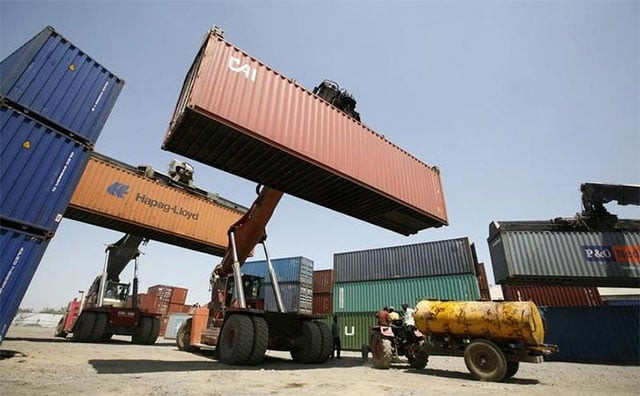Trade policy implementation poses daunting challenges
Export target looks over-ambitious and promised funds may not be released

PHOTO: REUTERS
The policy framework, announced on March 22 this year, had faced bureaucratic hurdles and lack of political will that wasted precious time that should otherwise have been used to focus efforts on propelling the country’s falling exports.
During the 2015-16 budget, the government had allocated Rs6 billion for implementing the policy framework in the first year, out of the total budget of Rs20 billion. However, it seems that the amount will remain unutilised as only two months are left before the close of current fiscal year.
This suggests that the government wasted an entire year in preparing the policy document as its draft remained unattended to at the Prime Minister’s Secretariat for six months. An official of the Ministry of Commerce told The Express Tribune that it was meaningless to keep the policy draft at the PM Secretariat for such a long time as nothing was changed and the same document was returned.
Poor governance can also be gauged from the fact that the Ministry of Commerce and the Ministry of Law took a month to issue import and export orders after the unveiling of trade policy and they have not yet notified the subsidies.
The two shift the blame on each other as the commerce ministry insists it had immediately sent draft notifications to the law ministry for vetting, but the latter argues that the drafts were poorly prepared and were full of mistakes that required time to rectify.
Whatever the reasons are, the ultimate loser is the country as its exports are continuously falling.
Drawbacks
The policy itself has many loopholes and shortcomings. Foremost among them is its apparent excessive focus on the manufacturing industry, particularly on producers of fans, cutlery, sports goods and leather.
This ignores the fact that a major chunk of Pakistan’s exports comprises agro-products. Even a journalist pointed out at a press conference held by the commerce minister that the entire policy looked to be revolving around the Gujranwala division of Punjab.

Before the policy announcement, it was expected that a comprehensive strategy would be adopted for high-value agricultural products including perishable goods, which were more or less ignored with no effective mechanism except for wheat, cotton, rice and sugar.
Horticulture has a significant export potential, particularly off-season fruits and vegetables that have a high demand in certain regional markets. There is a need to adopt latest technology for enhancing exports of these high-value products.
Pakistan has certain geographical advantages and it is considered a backyard farm of the Central Asian States and the Middle East with remarkable potential for export of agriculture products.
Moreover, Pakistan’s organic and Halal food could also make inroads into global markets, but here again no concrete measures have been taken.
However, it is a positive sign that as a short-term strategy the policy has identified certain goods including horticulture products, meat and basmati rice, but these should meet international packaging and safety standards.
The policy also does not address poor coordination between government departments and between the centre and provinces over certain policy issues pertaining to agriculture.
Funds are delayed
Irrespective of what is missing in the policy, historically the release of funds for implementation has always been a challenge and it seems that this policy will be no different.
In addition to this, questions are being raised about the institutional capacity to execute the policy as the Trade Development Authority of Pakistan (TDAP) doesn’t have the capacity to promote exports beyond traditional products.
An example of the lethargic approach is the import of a vapour heat treatment plant worth over $2 million some three years ago, but it has been lying at the Karachi Expo Centre since then.
Owing to lack of hygiene standards, Japan has suspended import of vegetables and fruits from Pakistan, but no step has been taken to utilise the plant nor is it being handed over to the private sector.
The Pakistan Horticulture Development and Export Company has also not been able to perform satisfactorily because of the absence of its permanent head and scarcity of technical staff and financial resources.
The targets set in the trade policy framework could be achieved if the government takes prompt administrative and financial measures in addition to adopting new technology for value addition to traditional exports.
the writer is a staff correspondent
Published in The Express Tribune, May 2nd, 2016.
Like Business on Facebook, follow @TribuneBiz on Twitter to stay informed and join in the conversation.



















COMMENTS
Comments are moderated and generally will be posted if they are on-topic and not abusive.
For more information, please see our Comments FAQ